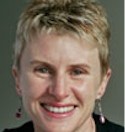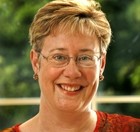Angela Mollard is a national columnist in Australia’s News Corp publications each Sunday. She writes about lifestyle, relationships, parenting, politics, society and news-based issues and appears regularly as a commentator on Channel 9 and Sky, as well as various radio. She is married with two daughters and a cat. When she’s not writing or reading, she attempts exercise. Angela’s recently published book – The Smallest Things: Thoughts on Making a Happy Family – deals with the real life of parenting – both its highs and lows! Kiwi Families reviewer, Rachel Cunliffe, asked Angela some questions about her new book.
Angela, you’re an avid reader but you mentioned that you’re yet to read a parenting book cover-to-cover and the only parenting expert you can bear is Nigel Latta. Can you expand more on why that is?
Most parenting books make me feel like I’m getting it all wrong so I try to avoid them. But Nigel Latta is brilliant – I love his style, his expletives, his firm grip on reality. He makes you feel as if he’s alongside you, not finger-wagging from above. That said, I have every intention of reading Martin Seligman’s The Optimistic Child – probably around the time my kids leave home.
I love your list of suggested books for various ages and that it features Australian and New Zealand writers. You mention you love reading a lot of blogs too – which ones do you enjoy reading currently?
Mrs Woog of Woogsworld is fabulous, as is Kerri Sackville’s Life and Other Crises. I enjoy Mamamia and sometimes write for it. I also adore two US websites – A Cup of Jo – and Cashmere and Cupcakes which is a glamorous reminder of what life is like without kids.
You talk a lot about your mum and all sorts of other relationships past and present in the book, but I noticed you don’t talk about your relationship with your dad. Why is that?
Mmm, insightful. I’m very close to my Mum but my Dad is more emotionally closed. As a Sunday columnist I’ve had to write columns to coincide with Father’s Day on four occasions now and I always find it difficult. Mine is neither a horror dad nor that over-worn caricature – the dunce dad. He’s just someone who can’t express love in conventional ways. But recently he showed me his impressive model railway and I noticed the odd names on his model sawmills, post offices and stations. My brothers, children and husband all have a building bearing their name – only spelt backwards. My Dad doesn’t know how to tell me he loves me but right in the middle of his beloved train set is the Alegna Coal Mine.
I loved the original format of the book with a mix of memoir and tips. I felt more inclined to take your advice knowing more about your life and background. I loved the set-up: the crisis point, then taking us back to what led you to that point, and things you did more of afterwards. I felt I wanted to know more about the practical steps you did to cut back on the work part of your work-life balance. For example: did you stop hiring a babysitter for your kids after school and make sure you’re at home, do you consciously put away your phone when you’re with them, what is a typical week rhythm like now in your household? What things have you let go of doing?
Thanks – I’m so glad the format works because it does cross two genres. Most critically, I learned to say “no”; to ring fence the things that are important to me so that those things got the best of me. So, I don’t do canteen duty at school but do help out with reading. My typical work involves working fairly intensively from Monday to Wednesday including a long day on Tuesday then Thursday and Friday are easier days. My television commentating work fits in around that – and I do work every Saturday morning for a couple of hours doing a TV segment. Writing a column is not nearly as demanding as magazine journalism in so much as you spend time thinking and researching rather than being constantly called by editors. I LOVE that my new job means my phone rarely rings.
In terms of cutting back, I now know how much work I can take on irrespective of whether I want to do it or not. So, yes, sometimes I say yes because something is a professional challenge but I do it knowing it may impact on my parenting for a short time.
I still have a terrible email/social media checking habit and that’s my challenge this year – to put it away. In fact I’ve “pinky promised” my youngest daughter that I’ll improve and she’s giving me a success rating every month. So far, I’m not doing great!
Finally, you’ve travelled a lot with and without kids. What are your tips for travelling with kids and where would you recommend taking them?
Ha! Yes we’ve got plenty of experience.
1. Don’t fly long haul when they’re aged between one and three. If you have to, try to break the flight so you can recover, swim and walk and then get on a second night flight. We always opt for night flights if we can. Also, tag team – we had one horrendous flight when our eldest was 18-month-old. She slept for only 30 minutes of the 24- hour flight and we both stupidly stayed awake. We should have looked after her in four-hour time slots.
2. Everywhere in NZ is great with kids. We’ve had holidays to Hahei, Marlborough Sounds and the Hawkes Bay in the last 10 years and they’ve all been great. Nothing better than a bach holiday.
3. Fiji is terrific with kids because the people are so friendly and obliging and there’s plenty of easy stuff to do.
4. I love going to museums with the kids. Canberra is great for that and ours love Te Papa in Wellington.
5. We went to Paris when the girls were aged eight and 11. It was incredible seeing them so excited. I always think it pays to travel when the weather is the best it can be. We once went to the UK in February and it was the most miserable trip because we all got sick.
6. Plan the occasional adult only holiday. I went trekking in Nepal to Everest Base Camp and my husband went skiing in Canada. Those things remind you you’re still the intrepid person you once were before family consumed you.







Really interseting interview 🙂
Love this part “Most critically, I learned to say “no”; to ring fence the things that are important to me so that those things got the best of me.”
Off to read some more of her work and also check out her other blog recommendations too.
Thanks
Awesome interview, thanks!